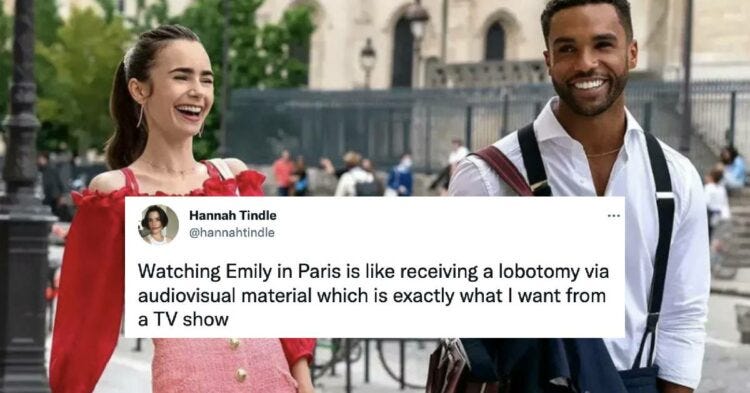If We Hate it So Much, Why Are We Still Watching?
What the global success of an allegedly unwatchable show tells us about ourselves
This Edition of Ecstatic is by Yi Ning Chiu
Many of the 220 million people on this planet who use Netflix have a very strange relationship with Emily in Paris: we appear to hate this show, yet its last season premiered in the Netflix Top Ten in 93 countries. If we were to compile all the internet responses to this show and take the average, the result would probably sound like Spencer Kornhaber at The Atlantic, who insists that Emily in Paris is NOT a guilty pleasure before acknowledging that he is about to apologize profusely for liking it. What’s going on?
If you haven’t watched this show, here’s the plot in a sentence: there’s a girl named Emily and she’s having adventures in Paris. My sister described it as a show about young adulthood as written by an Instagram algorithm, and this is all you need to know to have an accurate gauge of its storyline and aesthetic. Entertainment Weekly calls the experience of watching Emily in Paris a “five hour brain vacation,” which I think is an accurate summary of its appeal and a clue as to why we get so weird when we talk about it.
Now that you know what this show is about let’s place it in context. Emily in Paris premiered in October 2020, following a summer of racial reckoning and six months of pandemic lockdown. The week the show appeared on my Netflix recommendations I was alternating between monitoring the development of wildfires in my county and wringing my hands over how to best respond to the events of 2020 as a Christian with ethical obligations — oh, a five hour brain vacation? Maybe I would just watch the first episode…
Emily in Paris was among the few cultural phenomena of 2020 that did not involve a traumatizing event or a moralizing voice telling us how to meet the moment. Nothing really happens in this show, and no character has enough interiority to provoke you to think about life with any seriousness. The first season offered rest for the weary the moment it came out, and its subsequent seasons remain popular because the intervening years have generated enough global crises to keep us in need of mindless comfort. I’m not using mindless pejoratively; I really think the adjective explains why this show is so pleasurable.
The delights of Emily in Paris come from its total focus on sensory experiences. People in this show spend their days eating good food, wearing expensive clothes, having sex in glamorous locations, and working at jobs focused on aesthetic pleasures so they can do everything all over again. You may want to know if the show has anything thoughtful to say about this — doesn’t Emily work at a marketing firm? Doesn’t she share all her Parisian adventures via Instagram Live? Is this a commentary on desire and self-curation amidst the depredations of late-stage capitalism?
No, this show is extremely literal. If you try to read into it you will only discover, like the AV Club’s Saloni Gajjar, that it is “consistently vacuous,” and all it provides is a fun, stupid time.
The qualities that make Emily in Paris irresistible are the ones that also make it repellent. Many of us are rightfully aware of the world’s challenges and struggling to respond. We are reorganizing our lives and determining where to volunteer and how to donate and who to vote for. Watching a show about poster children for conspicuous consumption is a nice break from these activities, but it also seems like a weakening of the responsible posture many of us feel we need to assume if the world is going to be stopped from bursting into flame. We could probably all use a break, but we’re scared of what this says about us. Are we superficial? Do we secretly want to buy a million new outfits and eat an expensive dinner in Provence? Maybe, but I don’t think this is surprising.
Among the things that have made the last few years close to unbearable is how frequently people have been called upon to suspend the appetites innate to being human. Ecological crises, economic crises, and political crises endangered the simplest pleasures — breath, touch, a peaceable walk down the street. I suspect that those of us with sufficient means to pay for a Netflix subscription have added another layer of frustration to this situation for ourselves.
I cannot tell you how many think pieces I’ve read between 2020 and 2023 to educate myself about structural failures in the healthcare system, or how many debates I’ve entered into over the reality of racial violence in America. While policy solutions and structural changes are clearly essential and worth thinking through, as a single human person I needed something simple, visceral, and unobtainable at the time. Better healthcare for my family, immediately. A sense of safety on my block. As much as I could pontificate on these subjects I could never tell anyone outright what I longed for, and no one else I spoke to could admit to what they wanted either.
Many of us are attempting a disembodied response to embodied problems. No wonder Emily in Paris is so annoying; this whole show is matter over mind, human appetites of every variety placed front and center with little apology, when some of us are trying to get through these trying times by denying how beholden we are to the needs of our physical bodies.
Counselors Dale and Juanita Ryan describe the Christian life as a gradual acceptance of the truth that we are creatures, not the Creator, and while I wouldn’t necessarily endorse all of Emily in Paris as a theological text, I do think the show goads us with the suggestion that we are not exclusively cerebral beings in possession of competence and moral rigor but bodies enticed at the prospect of extravagantly unjustifiable care.
Jesus was aware of this and it did not bother him. He famously instructed his listeners not to worry about what they would eat and drink not because he thought these concerns were unimportant but because he understood physical needs to be an inescapable part of human life. This is a teacher who warned against growing preoccupied with our bodies, and then alleviated us of the temptation to do so by healing the sick and feeding the poor, showing that he was capable of caring for our bodies himself. All people had to do to receive his care was present themselves before him and humbly confess their need.
Apparently, this is hard to do. Emily in Paris is objectively a very silly show, but terrible shows are made all the time and the world does not become this obsessed with denouncing them. For most of us, it’s hard to admit that we like this show and that we are okay with what this says about us because these sorts of confessions have never been easy, but regardless of what we say, the next season of Emily in Paris will probably premier once again in the Netflix Top Ten, reminding us of all the things we need but can’t bring ourselves to name.
Yi Ning Chiu
Writer & Teacher
Yi Ning is a writer who has contributed features to Relevant and Teen Vogue. You can find more of her work here: yiningchiu.com







"He famously instructed his listeners not to worry about what they would eat and drink not because he thought these concerns were unimportant but because he understood physical needs to be an inescapable part of human life." Yi Ning, love this post and your work. Thanks for teasing out cultural dynamics with nuance a lot of us can sense but can't quite put our finger on.
What a great take! Thanks for this.